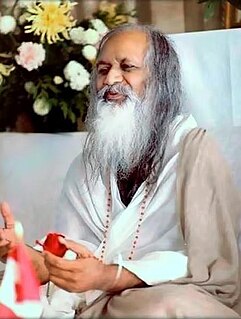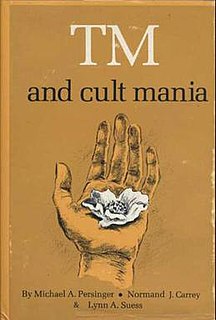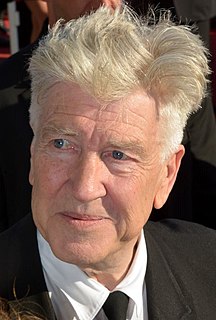
Transcendental Meditation (TM) is a form of silent mantra meditation advocated by the Transcendental Meditation movement. Maharishi Mahesh Yogi created the technique in India in the mid-1950s. Advocates of TM claim that the technique promotes a state of relaxed awareness, stress relief, and access to higher states of consciousness, as well as physiological benefits such as reducing the risk of heart disease and high blood pressure.

Maharishi Mahesh Yogi was an Indian yoga guru known for developing and popularizing Transcendental Meditation (TM), and for being the leader and guru of a worldwide organization that has been characterized in multiple ways including as a new religious movement and as non-religious. He became known as Maharishi and Yogi as an adult.

Maharishi International University (MIU), formerly Maharishi University of Management, is a private university in Fairfield, Iowa. It was founded in 1973 by Maharishi Mahesh Yogi and features a "consciousness-based education" system that includes the practice of the Transcendental Meditation technique. Its founding principles include the development of the full potential of the individual, fulfilling economic aspirations while maximizing proper use of the environment and bringing spiritual fulfillment and happiness to humanity.

The Transcendental Meditation movement (TM) are programs and organizations that promote the Transcendental Meditation technique founded by Maharishi Mahesh Yogi in India in the 1950s. The organization was estimated to have 900,000 participants in 1977, a million by the 1980s, and 5 million in more recent years.
3HO , also known as Sikh Dharma of the Western Hemisphere or Sikh Dharma International, is an American organization that started in about 1970. It was founded in the West by Harbhajan Singh Khalsa, also called "Yogi Bhajan"- Its followers are primarily Americans. Its adherents are popularly referred to as the Sikh Dharma Brotherhood. While referred to as the 3HO movement, "3HO" is strictly speaking the name only of the movement's educational branch.

Kriyananda was an American Hindu religious leader, yoga guru, musician, and an author. He was a direct disciple of Paramahansa Yogananda, and founder of the spiritual movement named "Ananda". He authored over 150 books, and composed about 400 piece of music. In 1998, he was found guilty of "constructive fraud", with a finding of "malice" and "fraudulent conduct" in a sexual harassment lawsuit.

Swami Brahmananda Saraswati, also known as Guru Dev, was the Shankaracharya of the Jyotir Math monastery in India. Born into a Saryupareen Brahmin family, he left home at the age of nine in search of a spiritual master. At age fourteen, he became a disciple of Svāmī Kṛṣṇānanda Sarasvatī. At the age of 34, he was initiated into the order of Sannyas and became the Śaṅkarācārya of Jyotir Math in 1941 at age 70. His disciples included Swami Shantanand Saraswati, Transcendental Meditation founder Maharishi Mahesh Yogi, Svāmī Swarūpānanda Sarasvatī and Swami Karpatri. According to the partisans of Shantānand Saraswati, Brahmānanda made a will five months before his death in 1953, naming Shantānand as his successor.

Diksha also spelled diksa, deeksha or deeksa in common usage, translated as a "preparation or consecration for a religious ceremony", is giving of a mantra or an initiation by the guru of Indian religions such as Hinduism, Buddhism, and Jainism. Diksa is given in a one-to-one ceremony, and typically includes the taking on of a serious spiritual discipline. The word is derived from the Sanskrit root dā plus kṣi or alternately from the verb root dīkṣ. When the mind of the guru and the disciple become one, then we say that the disciple has been initiated by the guru. Diksa can be of various types, through the teacher's sight, touch, or word, with the purpose of purifying the disciple or student. Initiation by touch is called sparśa dīkṣā. The bestowing of divine grace through diksa is sometimes called śaktipāt.
Prudence Anne Villiers Farrow Bruns is an American author, meditation teacher, and film producer. She is the daughter of film director John Farrow and actress Maureen O'Sullivan and younger sister of actress Mia Farrow. Farrow is the subject of the Beatles song "Dear Prudence," which references her time studying Transcendental Meditation in Rishikesh with the Beatles in early 1968.
The APA Task Force on Deceptive and Indirect Methods of Persuasion and Control (DIMPAC/DITPACT) was formed at the request of the American Psychological Association (APA) in 1983. The APA asked Margaret Singer, a leading theorist in cults and coercive persuasion, to chair a task force to "expose cult methods and tactics". Some examples that led to the task force's creation were the Manson family murders, Patty Hearst kidnapping, and the Jonestown massacre.
Gururaj Ananda Yogi was the founder of International Foundation of Spiritual Unfoldment and Foundation for International Spiritual Unfoldment (FISU), another meditation society, is also based on his teachings. Gururaj Ananda Yogi started giving satsang in his living room at his home in South Africa and during 1974 with the help of some of his disciples in South Africa started The South African Meditation Society and The International Foundation for Spiritual Unfoldment. In October 1974 Marguerite Cusley a teacher from Transcendental meditation of Maharishi Mahesh Yogi, organized for him a trip to the UK where Gururaj Ananda was introduced to many TM teachers from around the world and who soon joined his movement, The International Foundation for Spiritual Unfoldment (IFSU).

TM and Cult Mania is a non-fiction book that examines assertions made by the Transcendental Meditation movement (TM). The book is authored by Michael Persinger, Normand Carrey and Lynn Suess and published in 1980 by Christopher Publishing House. Persinger is a neurophysiologist and has worked out of Laurentian University. He trained as a psychologist and focused on the impacts of religious experience. Carrey is a medical doctor who specialized in psychiatry. He focused his studies into child psychiatry with research at Dalhousie University, and has taught physicians in a psychiatry residency program in the field of family therapy. Suess assisted Persinger in researching effects of geological phenomena on unidentified flying object sightings in Washington; the two conducted similar research in Toronto and Ottawa.

The Global Country of World Peace (GCWP) is a non-profit organization that claims to promote Transcendental Meditation, education, and the construction of "buildings for peace" in the world's major cities. Inaugurated by Maharishi Mahesh Yogi, the founder of Transcendental Meditation, on October 7, 2000, the GCWP was originally conceived as "a country without borders for peace-loving people everywhere." It has issued a currency called the "Raam" and its leader is neurologist Tony Nader.
The local churches and the ministry of Watchman Nee and Witness Lee have been the subject of controversy in two major areas over the past fifty years. To a large extent these controversies stem from the rapid increase and spread of the local churches in the United States in the 1960s and early 1970s. In the 1970s they became a target of opposition of fledgling countercult ministries. Unsupported criticisms of anti-social behaviors led to three libel litigations. In addition, some criticized the teaching of Witness Lee on the nature of God, God's full salvation, and the church.

The David Lynch Foundation for Consciousness-Based Education and World Peace is a global charitable foundation with offices in New York City, Los Angeles, and Fairfield, Iowa. It was founded by film director and Transcendental Meditation (TM) practitioner David Lynch in 2005 to fund the teaching of TM in schools. Over the years it has expanded its focus to include other "at-risk" populations such as the homeless, U.S. military veterans, African war refugees and prison inmates.
David W. Orme-Johnson is a former professor of psychology at Maharishi University of Management in Fairfield, Iowa. He is the author of over 100 papers investigating the effects of the Transcendental Meditation technique.
The History of Transcendental Meditation (TM) and the Transcendental Meditation movement originated with Maharishi Mahesh Yogi, founder of the organization, and continues beyond his death (2008). In 1955, the Maharishi began publicly teaching a traditional meditation technique learned from his master Brahmananda Saraswati, which he called Transcendental Deep Meditation, and later renamed Transcendental Meditation.
The Transcendental Meditation technique is the technique associated with the practice of Transcendental Meditation developed by the Indian spiritual figure Maharishi Mahesh Yogi. The practice involves the use of a private mantra, and is practised for 20 minutes twice per day while sitting comfortably with one's eyes closed. Unlike some other approaches to meditation, TM instruction encourages students not to be alarmed by random thoughts which may arise, but to easily return to the mantra when one becomes aware of this.
Transcendental Meditation in education is the application of the Transcendental Meditation technique in an educational setting or institution. These educational programs and institutions have been founded in the US, United Kingdom, Australia, India, Africa and Japan. The Transcendental Meditation technique became popular with students in the 1960s and by the early 1970s centers for the Students International Meditation Society were established at a thousand campuses in the US with similar growth occurring in Germany, Canada and Britain. The Maharishi International University was established in 1973 in the US and began offering accredited, degree programs. In 1977 courses in Transcendental Meditation and the Science of Creative Intelligence (SCI) were legally prohibited from New Jersey (USA) public high schools on religious grounds by virtue of the Establishment Clause of the First Amendment. This "dismantled" the TM program's use of government funding in U.S. public schools "but did not constitute a negative evaluation of the program itself". Since 1979, schools that incorporate the Transcendental Meditation technique using private, non-governmental funding have been reported in the US, South America, Southeast Asia, Northern Ireland, South Africa and Israel.

Bob Roth is an American Transcendental Meditation (TM) teacher and author. He is the CEO of the David Lynch Foundation and a director of the Center for Leadership Performance.








